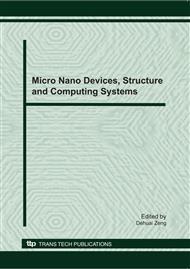[1]
T. Berners-Lee et al. The Semantic Web. Scientific American, Vol. 284, No. 5(2001), pp.34-43.
Google Scholar
[2]
T. Lukasiewicza, U. Stracciab. Managing Uncertainty and Vagueness in Description Logics for the Semantic Web. Journal of Web Semantics, Vol. 6, No. 4(2008), pp.291-308.
DOI: 10.1016/j.websem.2008.04.001
Google Scholar
[3]
C. S. Lee, Z. W. Jian, and L. K. Huang. A Fuzzy Ontology and its Application to News Summarization. IEEE Transactions on Systems, Man and Cybernetics (Part B), Vol. 35, No. 5(2005), pp.859-880.
DOI: 10.1109/tsmcb.2005.845032
Google Scholar
[4]
C. S. Lee, Y. J. Chen, and Z. W., Jian. Ontology based Fuzzy Event Extraction Agent for Chinese E-news Summarization. Expert Systems with Applications, Vol. 25, No. 3(2003), p.431–447.
DOI: 10.1016/s0957-4174(03)00062-9
Google Scholar
[5]
Q. T. Tho, S. C. Hui, A. C. M. Fong, and T. H. Cao. Automatic Fuzzy Ontology Generation for Semantic Web. IEEE Transactions on Knowledge and Data Engineering, Vol. 18, No. 6(2006), pp.842-856.
DOI: 10.1109/tkde.2006.87
Google Scholar
[6]
D. Z. Kang, B. W. Xu, and J. J. Lu. Description Logics for Fuzzy Ontologies on Semantic Web. Journal of Southeast University (English Edition), Vol. 22, No. 3(2006), pp.343-347.
Google Scholar
[7]
Raymond Y.K. Lau. Fuzzy Domain Ontology Discovery for Business Knowledge Management. IEEE Intelligent Informatics Bulletin, Vol. 8, No. 1(2007), pp.29-41.
Google Scholar
[8]
J. Zhai, Y. D. Liang, and Y. Yu. Semantic Information Retrieval Based on Fuzzy Ontology for Electronic Commerce. Journal of Software, Vol. 3, No. 9(2008), pp.20-27.
DOI: 10.4304/jsw.3.9.20-27
Google Scholar
[9]
J. Zhai, Y. Cao and Y. Chen. Semantic Information Retrieval Based on Fuzzy Ontology for Intelligent Transportation Systems. In: Proceedings of the 2008 IEEE International Conference on Systems, Man, and Cybernetics (SMC 2008), Singapore, pp.2321-2326(2008).
DOI: 10.1109/icsmc.2008.4811639
Google Scholar
[10]
J. Zhai, Y. Chen, and Y. Yu. Fuzzy Semantic Retrieval for Traffic Information Based on Fuzzy Ontology and RDF on the Semantic Web. Journal of Software, Vol. 4, No. 7(2009), pp.758-765.
DOI: 10.4304/jsw.4.7.758-765
Google Scholar
[11]
W3C, Resource description framework (RDF): concepts and abstract syntax, in: G. Klyne, J.J. Carroll, B. McBride (Eds. ), W3C Recommendation, 10, February 2004. <http: /www. w3. org/TR/2004/REC-rdf-concepts-20040210/>.
Google Scholar


